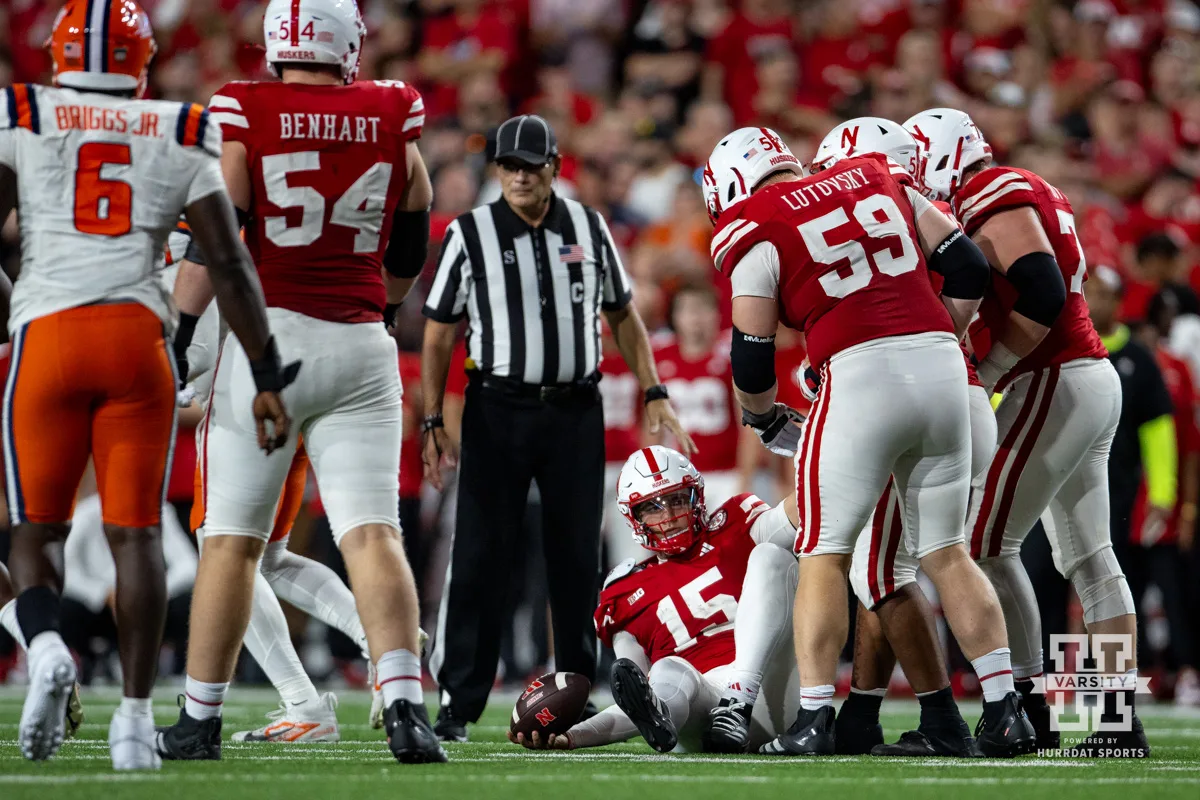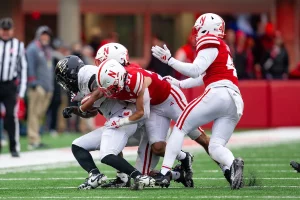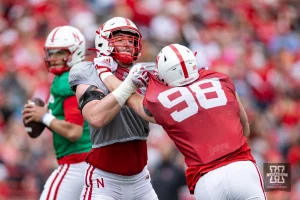Well, that game was a disaster. We can all agree on that, right? I could easily recap what happened, but if you’re reading this, it’s clear you witnessed Nebraska’s collapse firsthand. Instead, I want to dig deeper into each phase of the game and highlight what absolutely needs to be addressed—like, yesterday. This program is undeniably heading in the right direction, but if we genuinely want to take a significant step forward, we need to tackle these issues immediately. The potential is there; it just needs to be unlocked. I believe that most of these problems are fixable, but it’s crucial we approach them with urgency and a clear plan. Let’s break it down phase by phase.
Offensively, I’m not overly upset, but there are definitely some key areas that we need to address moving forward. The inability to run the football effectively inside is particularly concerning to me. It was troubling to see how we struggled with our inside zone, split zone, and power plays. These are foundational elements of our offensive scheme, and when they falter, it puts immense pressure on the entire unit. I’ve been quite vocal on the radio about my belief that this is fundamentally a run-first offense. When Dylan isn’t forced to carry the entire load, I genuinely believe he can excel and do remarkable things for us. He has the talent to make plays, but we shouldn’t be relying on him to do it all. I want the ball in his hands, especially given his playmaking ability, but over-relying on him as a freshman could lead to more errors. Getting our run game back on track is crucial. If we can establish a solid ground attack, it will not only relieve some pressure off Dylan but also open up the playbook for the coaching staff. A successful run game creates opportunities for play-action passes, which can stretch the defense and create mismatches. Additionally, fixing the run game can also help control the clock and dictate the pace of the game, giving our defense a breather. Overall, I believe that if we can make these adjustments and reinforce our running attack, we’ll be in a much better position moving forward.
Defensively, I’m genuinely worried. The performance from our defensive backs was nothing short of atrocious. There’s really no other way to put it. The communication breakdowns were glaringly obvious, resulting in far too many wide-open receivers. It was painfully clear that we weren’t properly bracketing players, and our zone coverage lacked the necessary pass-off discipline. The safeties seemed to be standing flat-footed far too often, which is simply unacceptable at this level of competition. I’m left wondering if this is a schematic issue, especially given the recent changes we’ve made, or if it’s more about the coaching itself. Right now, my eyes are on Butler and how he plans to correct these glaring deficiencies. Let’s be honest: say what you want about Evan Cooper, but we didn’t see these kinds of issues last season. There was a level of cohesion and communication that seems to be missing this year. Coach Rhule mentioned earlier this week that mid-game adjustments would be necessary, yet we saw none of that on the field. We continued to give up open receivers and bit on play action every single time at the goal line, which is incredibly frustrating. It’s essential that we improve our in-game adjustments as we continue to move forward in Big Ten play, where the competition will only continue to get tougher.
Special teams… my lord. Once again, Nebraska’s special teams are nothing short of abysmal. To me, this is the least fixable issue we face THIS SEASON. Sure, there’s been plenty of talk about firing Coach Foley, and while that might result in some marginal improvements in kick or punt coverage, it won’t address our most significant liability: field goal kicking. Right now, the entire operation surrounding field goals is just terrible—there’s no other way to say it. From the long snapping to the holding and the actual kicking, the execution as a unit is lacking across the board. It’s not just one isolated problem; it’s a full-on systemic failure. Firing someone in the heat of the moment won’t magically resolve these deep-rooted issues. If we want to have a candid discussion about coaching changes at the end of the season, I think that’s entirely appropriate, but for now, we need to focus on fixing what we can. Honestly, I’m not joking when I say I am worried about EVER sending the field goal unit out again in close games. It’s a daunting thought, especially in tight contests where every point matters. If the situation is manageable, I’d rather see the ball in 15’s hands and let him make a play. I can live with that; at least I’d have faith in his ability to create a scoring opportunity.
Lastly, and my MOST concerning issue, is the overtime situation we witnessed. In my opinion, that was more troubling than any of the other issues we’ve discussed. The mindset displayed during that crucial moment was incredibly disheartening. To completely collapse when the game was still technically winnable is beyond upsetting. It speaks volumes about the mental fortitude of the team and raises serious questions about our readiness to handle high-pressure situations. Defensively, allowing an inside zone play to be bounced outside and nearly result in a score is just a sign of undisciplined play. That kind of mistake can’t happen at this level, especially in critical moments like overtime when every single play counts. The players need to maintain their responsibilities and execute their assignments. When they don’t, it not only puts the game at risk but also sends a message that we might not be prepared to handle adversity. On the offensive side, the chain of events that led to a procedural penalty turning into three sacks is simply unacceptable. That’s not just a failure in execution; it’s a complete breakdown in composure. To throw away a chance to win the game due to self-inflicted mistakes is inexcusable. If I were Coach Rhule, I would be having serious conversations with my coordinators and the captains of each unit and see how our mindset got so bad. It’s essential to dissect what went wrong in those moments, both strategically and mentally. It wasn’t just the result that was concerning; it was the overall mental meltdown that transpired. This reflects a lack of focus and resilience that needs to be addressed immediately. If we want to be competitive, especially moving forward into the rigors of the season, we need to develop a stronger mindset.
I know today’s edition has been quite negative, and I recognize that. However, it’s essential to highlight there was some positives, like the way we utilized Fidone—he is real asset for our offense. Still, this vent session was necessary. I genuinely believe most of the issues we’ve identified can be corrected through film evaluation. It’s crucial for the coaching staff to dissect the game footage and address these shortcomings quickly. Each player needs to understand their mistakes and how to improve, as this isn’t just about individual performance but about creating a cohesive unit. Ultimately, it’s on the coaches to implement these changes and ensure the team is prepared for the challenges ahead. If they act swiftly, we can build on the positives and turn things around.
As always, GBR and In Rhule We Trust.




